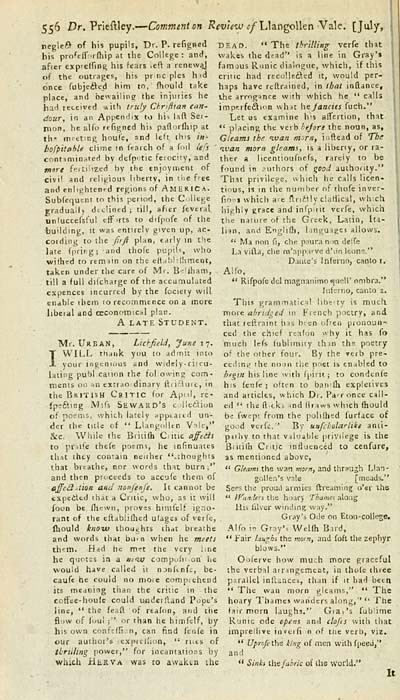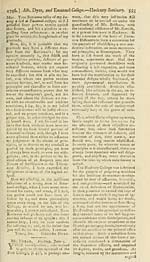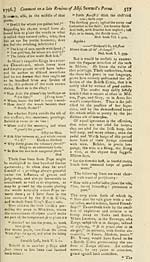Download files
Complete book:
Individual page:
Thumbnail gallery: Grid view | List view

556 Dr. Prleftley. — Comment on ^^"y/Vu; ^/Llangollen Vale. [July,
reglef^ of his pupils, Dr. P. refigned
his profeff'.rfhip at the College: and,
aficr exprelfini^ his fears .eft a renewaj
of the outrages, his pr nc pies hid
once fubjeited him to, ftiould take
place, and bewailine the iniiiries he
had received •Aith truly Chriftian cun-
dour, in an Appendix to hi^ laft Ser-
mon, he alfo refis^ned hi* paflorflup at
th- mtetiflg houCe, snd left th-s in-
hofpitohle clime !n fcarch of a (oil iefs
contiminHted by defp<:tic ferocity, and
more fViCiitzed by the enjoyment of
civil and religious liberty, in ciie free
and enlighteni-d regions of AMERICA.
Subfequent to this period, the Culiege
graduall) declined ; till, after feveral
unluccefsful eff Tts to difpofe of the
building, It was entirely given up, ac
coiding to the firfl plan, early in the
Jate fprirg; and thofe pupils, who
wilhtti to rtrmin on the ellHbl.lJiment,
taken under the care of Mr. B-'lham,
till a full dilcharge of the accumulated
expences incurred by the fociety will
enable them to recommence on a more
libeial and ecconomicsl plan.
A LATE Student.
Mr. Urban, LUhJieU, Jutie ii.
I WILL thank you to admit into
your ingenious and widely- rirru-
latiiig publ cation the following com-
ments 00 an cxtrao dinary ibi'Tuie, in
the British Critic for Apnl, re-
fpefting Mifs Seward's olletlion
of poems, which lately appeared un-
der the title of •' LlangiilUn V''le,"
&c. While the Britifh Ciitic aff^iis
to praife thefe po^ms, he infinuates
th.1t they contain ncaher ".thoughts
that breathe, nor words that burn;"
and then proceeds to accufe them of
offedAion and nonfenfe. It cannot be
cxpedtd that a Critic, who, as it will
foun be ni':vvn, prov^rs hmifelf igno-
rant of the eftablilhed ulagea of verfe,
lliould knoiu thoughts that breathe
and words tiiat bum when he meets
them. Hdd he mtt the very ime
he quotes in a nt<w compuhion he
would have called it nonfenfe, be-
caufe he could no nioie comprehend
its meaning than the critic in the
cotfee-houfe could uiidetlland Pope's
line, •' the feaft of realon, and the
flow of loul ;" or than he himfelf, by
his own conftffi. n, can find ftiife in
our author's expicKion, " ruts of
ihrillins, power," for incantations by
which HiiRVA was to awaken ihe
DEAD. "The thrilling verfe that
wakes the dead" is a line in Gray'*
famous Runic dialogue, which, if this
critic had recoileifted it, would per-
haps have reftrained, in that inftance,
ihe arrog!*nce with which he " calls
impf.rfe^ion whjt he Janctes fuch."
Let us examine his airertion, that
" placing the verb hejore the noun, as.
Gleams thf. luan mirn, iaftead of The
' ivan morn gleams, is a libeny, or ra-
ther a licentioufners, rarely to be
found in ;'iithors of good authoiity."
That privilege, which he calls licen-
tious, is in the number of thofe inver-
fionj which a^e ftrii^tly claliical, which
highly grace and infpirit verfe, which
the nature of the Greek, Latin, Ita-
liin, and EngliQi, languages allows.
" Ma non fi, che pauranon delfe
La villa, che m'appa've d'un leone."
Daiue's Inferno, canto i.
Alfo,
" Rifpofe del magnanimo quell' ombra."
Jnferuo, canto 2.
This grammatical libcty is mucii
more abridged in French poetry, and
that leftraint has b-cn often pronoun--
ced the chief rcafon why it has To
much Iefs fublimity thin the poetry
of the other four. By the verb pre-
cerlint' the no;)n the poet is enabled to
bfgtn his line with (|iirit; to condcnie
his fenfe ; often to baii'fh expletives
and articles, which Dr. PaTonce call-
ed " the ft.tks nnd draws which Oiould
be fwept from the pohlhed furface of
good verfe.' By unfcr.olarlike anii-
pjihy to that valuable jiriviiege is the
Biitifh Crit.ic mfiucnctid to cenfure,
as mentioned above,
" Gleams the wan mam, and thrcsujh Llan-
gollea's vale [meads."
Sees the proui! armies ftreaming o'sr the
" IVanden tlie hoary Thames along
His iilvcr winding way."
Gray 'a Ode on Eton-college.
Alfoi-^ Grr.y'. WcKh Bjld,
" Fair Lmghi the morn, and foft the zephyr
blows."
Oijferve how mu:h more graceful
the verbal arrangement, in thole thiee
parallel inllances, than if it bad been
•' The wan morn gleams," " The
hoary Thames wanders along,'' " The
fair mora laughs." Giai's fublime
Runic ode opens and clofis with that
impreliive iii»ei(i n of the verb, viz.
*' Upnfe the king of men with fpeed,"
" Sinki \.\vi fabric of the world."
reglef^ of his pupils, Dr. P. refigned
his profeff'.rfhip at the College: and,
aficr exprelfini^ his fears .eft a renewaj
of the outrages, his pr nc pies hid
once fubjeited him to, ftiould take
place, and bewailine the iniiiries he
had received •Aith truly Chriftian cun-
dour, in an Appendix to hi^ laft Ser-
mon, he alfo refis^ned hi* paflorflup at
th- mtetiflg houCe, snd left th-s in-
hofpitohle clime !n fcarch of a (oil iefs
contiminHted by defp<:tic ferocity, and
more fViCiitzed by the enjoyment of
civil and religious liberty, in ciie free
and enlighteni-d regions of AMERICA.
Subfequent to this period, the Culiege
graduall) declined ; till, after feveral
unluccefsful eff Tts to difpofe of the
building, It was entirely given up, ac
coiding to the firfl plan, early in the
Jate fprirg; and thofe pupils, who
wilhtti to rtrmin on the ellHbl.lJiment,
taken under the care of Mr. B-'lham,
till a full dilcharge of the accumulated
expences incurred by the fociety will
enable them to recommence on a more
libeial and ecconomicsl plan.
A LATE Student.
Mr. Urban, LUhJieU, Jutie ii.
I WILL thank you to admit into
your ingenious and widely- rirru-
latiiig publ cation the following com-
ments 00 an cxtrao dinary ibi'Tuie, in
the British Critic for Apnl, re-
fpefting Mifs Seward's olletlion
of poems, which lately appeared un-
der the title of •' LlangiilUn V''le,"
&c. While the Britifh Ciitic aff^iis
to praife thefe po^ms, he infinuates
th.1t they contain ncaher ".thoughts
that breathe, nor words that burn;"
and then proceeds to accufe them of
offedAion and nonfenfe. It cannot be
cxpedtd that a Critic, who, as it will
foun be ni':vvn, prov^rs hmifelf igno-
rant of the eftablilhed ulagea of verfe,
lliould knoiu thoughts that breathe
and words tiiat bum when he meets
them. Hdd he mtt the very ime
he quotes in a nt<w compuhion he
would have called it nonfenfe, be-
caufe he could no nioie comprehend
its meaning than the critic in the
cotfee-houfe could uiidetlland Pope's
line, •' the feaft of realon, and the
flow of loul ;" or than he himfelf, by
his own conftffi. n, can find ftiife in
our author's expicKion, " ruts of
ihrillins, power," for incantations by
which HiiRVA was to awaken ihe
DEAD. "The thrilling verfe that
wakes the dead" is a line in Gray'*
famous Runic dialogue, which, if this
critic had recoileifted it, would per-
haps have reftrained, in that inftance,
ihe arrog!*nce with which he " calls
impf.rfe^ion whjt he Janctes fuch."
Let us examine his airertion, that
" placing the verb hejore the noun, as.
Gleams thf. luan mirn, iaftead of The
' ivan morn gleams, is a libeny, or ra-
ther a licentioufners, rarely to be
found in ;'iithors of good authoiity."
That privilege, which he calls licen-
tious, is in the number of thofe inver-
fionj which a^e ftrii^tly claliical, which
highly grace and infpirit verfe, which
the nature of the Greek, Latin, Ita-
liin, and EngliQi, languages allows.
" Ma non fi, che pauranon delfe
La villa, che m'appa've d'un leone."
Daiue's Inferno, canto i.
Alfo,
" Rifpofe del magnanimo quell' ombra."
Jnferuo, canto 2.
This grammatical libcty is mucii
more abridged in French poetry, and
that leftraint has b-cn often pronoun--
ced the chief rcafon why it has To
much Iefs fublimity thin the poetry
of the other four. By the verb pre-
cerlint' the no;)n the poet is enabled to
bfgtn his line with (|iirit; to condcnie
his fenfe ; often to baii'fh expletives
and articles, which Dr. PaTonce call-
ed " the ft.tks nnd draws which Oiould
be fwept from the pohlhed furface of
good verfe.' By unfcr.olarlike anii-
pjihy to that valuable jiriviiege is the
Biitifh Crit.ic mfiucnctid to cenfure,
as mentioned above,
" Gleams the wan mam, and thrcsujh Llan-
gollea's vale [meads."
Sees the proui! armies ftreaming o'sr the
" IVanden tlie hoary Thames along
His iilvcr winding way."
Gray 'a Ode on Eton-college.
Alfoi-^ Grr.y'. WcKh Bjld,
" Fair Lmghi the morn, and foft the zephyr
blows."
Oijferve how mu:h more graceful
the verbal arrangement, in thole thiee
parallel inllances, than if it bad been
•' The wan morn gleams," " The
hoary Thames wanders along,'' " The
fair mora laughs." Giai's fublime
Runic ode opens and clofis with that
impreliive iii»ei(i n of the verb, viz.
*' Upnfe the king of men with fpeed,"
" Sinki \.\vi fabric of the world."
Set display mode to: Large image | Transcription
Images and transcriptions on this page, including medium image downloads, may be used under the Creative Commons Attribution 4.0 International Licence unless otherwise stated. ![]()
| Early Gaelic Book Collections > Ossian Collection > Gentleman's magazine, and historical chronicle > Volume 66, Part 2 > (28) |
|---|
| Permanent URL | https://digital.nls.uk/79422107 |
|---|
| Description | Selected books from the Ossian Collection of 327 volumes, originally assembled by J. Norman Methven of Perth. Different editions and translations of James MacPherson's epic poem 'Ossian', some with a map of the 'Kingdom of Connor'. Also secondary material relating to Ossianic poetry and the Ossian controversy. |
|---|
| Description | Selected items from five 'Special and Named Printed Collections'. Includes books in Gaelic and other Celtic languages, works about the Gaels, their languages, literature, culture and history. |
|---|

